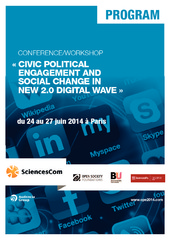Media addiction and political pariticpation
Конференцијски прилог (Објављена верзија)
Метаподаци
Приказ свих података о документуАпстракт
Grounded in above written theoretical frameworks, this exploratory study seeks to expand previous
research by addressing the main research hypothesis that increase in media addiction causes
decrease in political participation. Further research hypotheses are that the bigger media addicts
are people who have less confidence in future, who fear about present and future, who are not
interested in politics, who have lower political knowledge, and who have lower participation in
elections. In this research, these hypotheses are addressed by adequate research questions.
Main research question of this study concerns relation of media addiction and political participation.
Establishing this relation is goal of this study because of higher infiltration of media into people lives
and appearance of new media, use of the Internet on the go, and new technology. This study
examines possible dangers of new technology – media addiction and decline of political
participation. If people use ex...tensively media, they might not have time for voting or participating in
activities of common interest.
The next questions examine significant relations of media addiction and elements of political
participation with main aim to determine if increases in media addiction cause decreases in political
participation. Political participation may be basic pillar of democracy and lack of interest toward
“common interest” participative activities may be dangerous for societies.
Извор:
Civic political engagement and social spheres in the new digital era, Paris, France, 24 - 27 June 2014, 2014, 15-16Колекције
Институција/група
IFDTTY - CONF AU - Bojić, Ljubiša PY - 2014 UR - http://rifdt.instifdt.bg.ac.rs/123456789/2353 AB - Grounded in above written theoretical frameworks, this exploratory study seeks to expand previous research by addressing the main research hypothesis that increase in media addiction causes decrease in political participation. Further research hypotheses are that the bigger media addicts are people who have less confidence in future, who fear about present and future, who are not interested in politics, who have lower political knowledge, and who have lower participation in elections. In this research, these hypotheses are addressed by adequate research questions. Main research question of this study concerns relation of media addiction and political participation. Establishing this relation is goal of this study because of higher infiltration of media into people lives and appearance of new media, use of the Internet on the go, and new technology. This study examines possible dangers of new technology – media addiction and decline of political participation. If people use extensively media, they might not have time for voting or participating in activities of common interest. The next questions examine significant relations of media addiction and elements of political participation with main aim to determine if increases in media addiction cause decreases in political participation. Political participation may be basic pillar of democracy and lack of interest toward “common interest” participative activities may be dangerous for societies. C3 - Civic political engagement and social spheres in the new digital era, Paris, France, 24 - 27 June 2014 T1 - Media addiction and political pariticpation SP - 15 EP - 16 UR - https://hdl.handle.net/21.15107/rcub_rifdt_2353 ER -
@conference{
author = "Bojić, Ljubiša",
year = "2014",
abstract = "Grounded in above written theoretical frameworks, this exploratory study seeks to expand previous
research by addressing the main research hypothesis that increase in media addiction causes
decrease in political participation. Further research hypotheses are that the bigger media addicts
are people who have less confidence in future, who fear about present and future, who are not
interested in politics, who have lower political knowledge, and who have lower participation in
elections. In this research, these hypotheses are addressed by adequate research questions.
Main research question of this study concerns relation of media addiction and political participation.
Establishing this relation is goal of this study because of higher infiltration of media into people lives
and appearance of new media, use of the Internet on the go, and new technology. This study
examines possible dangers of new technology – media addiction and decline of political
participation. If people use extensively media, they might not have time for voting or participating in
activities of common interest.
The next questions examine significant relations of media addiction and elements of political
participation with main aim to determine if increases in media addiction cause decreases in political
participation. Political participation may be basic pillar of democracy and lack of interest toward
“common interest” participative activities may be dangerous for societies.",
journal = "Civic political engagement and social spheres in the new digital era, Paris, France, 24 - 27 June 2014",
title = "Media addiction and political pariticpation",
pages = "15-16",
url = "https://hdl.handle.net/21.15107/rcub_rifdt_2353"
}
Bojić, L.. (2014). Media addiction and political pariticpation. in Civic political engagement and social spheres in the new digital era, Paris, France, 24 - 27 June 2014, 15-16. https://hdl.handle.net/21.15107/rcub_rifdt_2353
Bojić L. Media addiction and political pariticpation. in Civic political engagement and social spheres in the new digital era, Paris, France, 24 - 27 June 2014. 2014;:15-16. https://hdl.handle.net/21.15107/rcub_rifdt_2353 .
Bojić, Ljubiša, "Media addiction and political pariticpation" in Civic political engagement and social spheres in the new digital era, Paris, France, 24 - 27 June 2014 (2014):15-16, https://hdl.handle.net/21.15107/rcub_rifdt_2353 .



